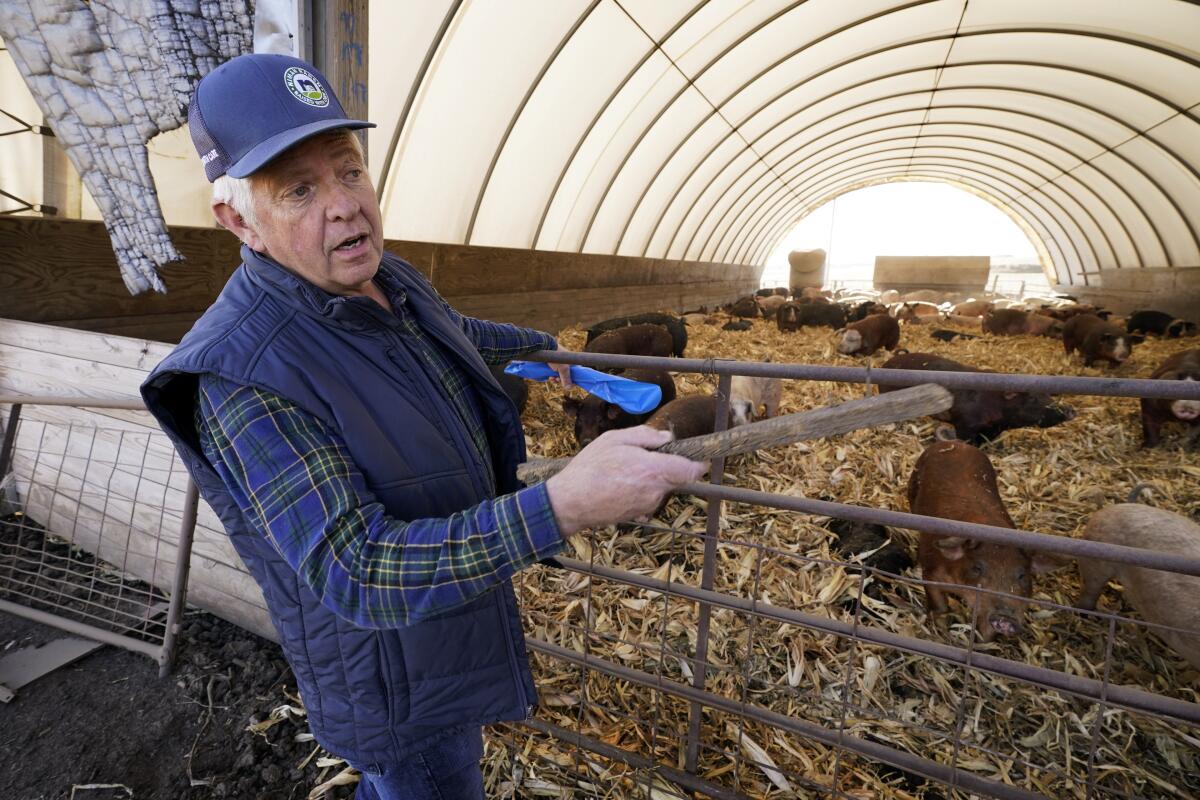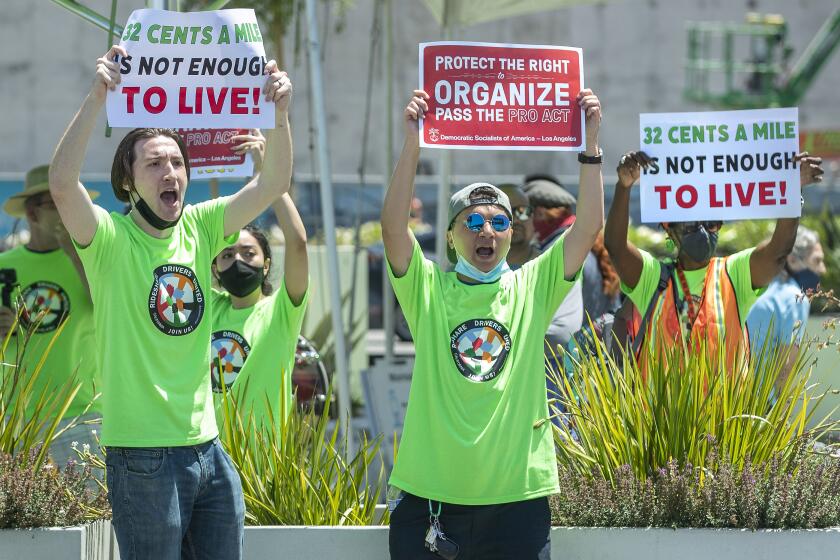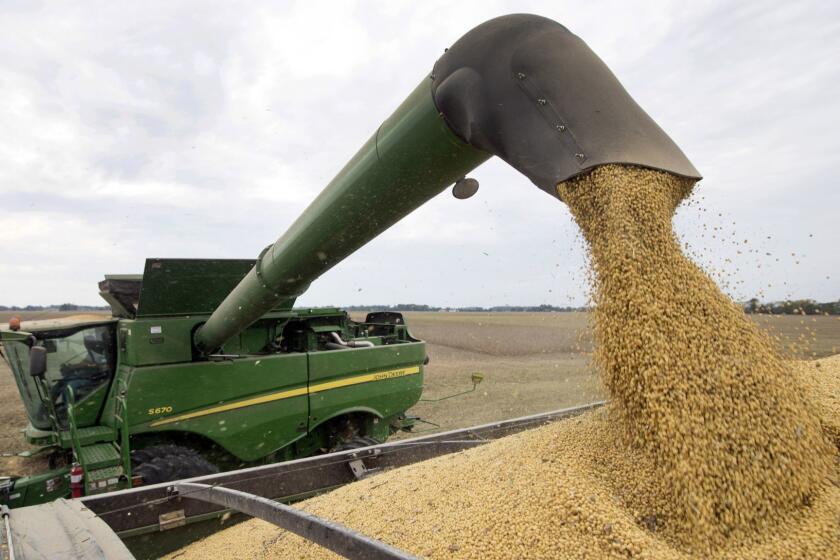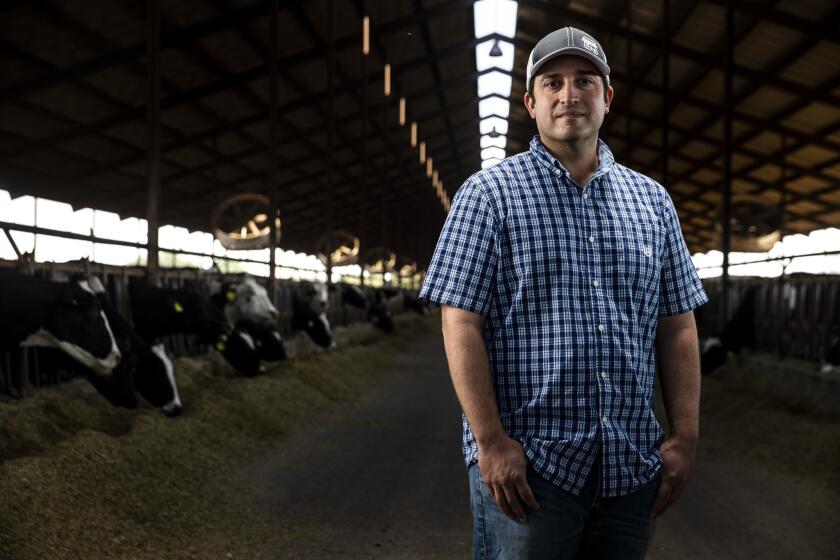Column: Pork producers are in full squeal over California’s farm animal rules. You should tune them out

Major pork producers — a big part of Big Meat, as the livestock industry is often known — have been pulling out the stops recently to eviscerate a California law regulating how they treat pregnant sows.
They’ve asked the Supreme Court to overturn the state’s regulations. (The justices may issue a decision on whether they’ll take the case as soon as Monday.)
They’ve been floating scary predictions about the consequences if the rules stand. These include the complete disappearance of bacon from Californians’ breakfast plates, and higher prices for uncooked pork products nationwide, not only in California.
The sows can’t move, they’re biting at the bars. There are massive, massive psychological welfare issues.
— Chris Green, animal law expert, on “gestation crates”
Then there’s the looming bankruptcy of thousands of mom-and-pop pig farms.
The National Pork Producers Council and American Farm Bureau Federation, the plaintiffs in the lawsuit under consideration by the Supreme Court, portray California’s law as an unconstitutional and almost unprecedented attempt by one state to impose its regulatory whim on the rest of the country.
Get the latest from Michael Hiltzik
Commentary on economics and more from a Pulitzer Prize winner.
You may occasionally receive promotional content from the Los Angeles Times.
They raise the prospect of platoons of gimlet-eyed inspectors sent out by California to make sure farms in the pork belt of the Midwest and North Carolina are complying with a law conjured up by those radical libs in the Golden State.
Under the circumstances, the response to these claims writes itself: They’re hogwash.
The industry’s target is Proposition 12 of 2018, which was passed with a solid 63% majority.
The measure, which went fully into effect on Jan. 1, took aim at several livestock practices of evident extreme cruelty. It established new standards for the treatment of farm animals in California, setting minimum space requirements and establishing civil and criminal penalties for egg-laying hens, veal calves and breeding sows.
Among the chief objectives of the initiative as well as its precursor, Proposition 2 of 2008, has been to eradicate “gestation crates.” These appalling devices confine pregnant sows so tightly that they can’t turn around, lie down or stretch their legs.
A California judge got it right: Prop. 22, California’s gig economy law, outrageously trampled on employee rights.
Breeding sows spend most of their lives in these coffin-like structures, starting when they’re first artificially impregnated at about 7 months of age.
They get moved into “farrowing crates” when they’re suckling their piglets, designed so that they can’t roll over and crush their offspring. The piglets are weaned at two to three weeks, and a few days later, the sows are impregnated again.
These practices may have been tacitly accepted by the public because pigs weren’t seen as they are — as intelligent animals that prefer room to roam. “The sows can’t move, they’re biting at the bars,” says Chris Green, executive director of the Animal Law and Policy Program at Harvard Law School. “There are massive, massive psychological welfare issues.”
Pigs are sometimes regarded as more intelligent than dogs, he noted, “but if you kept dogs in cages for the vast majority of their lives where they couldn’t even turn around, people would lose their minds — it would be very obvious that that was completely inhumane.”
Two elements of the law are what really get under Big Meat’s skin. One is the standard for sows: The law requires that pork producers provide at least 24 square feet of space per pregnant sow.
That’s a standard that isn’t currently met by the vast majority of pork production facilities in the U.S., according to the industry; compliance could cost more than $1 billion, not including ongoing costs to ensure that noncompliant and compliant pork products don’t get mixed together.
The second beef cited by the pork industry is that the measure established criminal and civil penalties for selling uncooked foods produced in violation of those standards, even if the sources were outside the state.
The lone valiant farmer struggling to eke an existence from his hardscrabble farm — that’s the image President Trump wants you to think about when contemplating the $28 billion in bailouts he’s spending to cover farm losses from his trade war.
That’s what makes the California law “impermissibly extraterritorial,” the pork producers say — that is, the state imposes its will on farmers outside its borders, and interferes with interstate commerce to boot.
As they point out, California accounts for 13% of pork consumption, but only 0.13% of the national breeding herd. California farmers won’t pay the price of California regulations: “It is to out-of-state sow farms that Proposition 12 almost exclusively applies.”
That’s the core of the argument that California voters were out of line in enacting Proposition 12.
A typical screed in this vein came from Republican Sen. Joni Ernst of pork-producing Iowa, who managed to bury the issue in a mound of ideological refuse: “Radicals in liberal states like California are punishing our hardworking farmers and producers in Iowa by enforcing Proposition 12,” she told a farm radio program last summer, calling its provisions “radical animal rights standards.”
Last month, Ernst’s fellow Iowan, Republican Sen. Charles E. Grassley, called on the Supreme Court to strike down “California’s war on breakfast.”
There are multiple problems with all these criticisms. One is that Proposition 12 has been reviewed multiple times by federal courts and has survived every challenge — three district court rulings, two forays before the 9th Circuit Appellate Court in San Francisco, and once by the Supreme Court, which last year let stand lower court rulings refusing to block the law. The case, however, is yet to be heard on its merits.
The only victory scored by opponents is modest — a recent order by a California state judge delaying the application of the law on California retailers until six months after state officials draft regulations. Those regulations are currently out for public comment. The plaintiffs had asked for a 28-month delay.
Another obstacle for the industry’s case is that there’s considerable precedent for laws in one state being upheld even if they have effects beyond its borders. Traditionally, courts have let these laws stand as long as they don’t discriminate against out-of-staters — that is, impose rules on others while exempting in-state residents.
California’s auto emissions regulations are a perfect example: Vehicles sold in the state have been required to meet especially stringent anti-pollution standards since the 1960s, sometimes by the installation of equipment not required elsewhere.
Farm prices are down, bankruptcies are up, farm equipment is getting more expensive and export markets are fading away: Is there anything to like about the impact President Trump has had on the agricultural economy of the United States?
Since California is such an immense car market, and since nearly a dozen other states have adopted its rules, the California standard has become almost a de facto national standard. Pork producers may be intent on overturning Proposition 12 because they foresee its mandates spreading nationwide.
There are also indications that the pork industry is exaggerating the impact of Proposition 12 for public consumption, while quietly acknowledging that it’s not that big a deal.
Hormel, one of the nation’s largest producers, stated publicly in October that it would be able to “fully comply” with the rules by Jan. 1 with “no risk of material losses,” and that its Applegate line of sausages and other prepared meats was then already in full compliance.
Tyson Foods executives told investors in August that the share of its market that would be impacted by Proposition 12 was “not significant for us today.”
Big Meat lobbyists like to depict their industry as one of small farmers plying a family trade on the edge of extinction — “65,000 farmers [raising] 125 million hogs per year” to place food on American tables, the plaintiffs petitioning the Supreme Court wrote.
That’s a misleading picture of a vast agribusiness, however. The industry has been consolidating for years; the big conglomerates preserve farming’s homespun image chiefly for political purposes, using “local symbolism and folk narratives, e.g., God Made a Farmer,” Loka Ashwood, an expert on farm society at the University of Kentucky, wrote in 2020.
“Industrial-scale agribusinesses effectively use such symbolism ... to maintain control over the political economy, despite ever lessening distribution of economic returns,” she observed.
The real targets of Proposition 12 are huge companies running piglet factories. “You have very few farmers left,” Ashwood told me. The gestation facilities subject to Proposition 12 tend to be facilities valued at more than $10 million holding 18,000 sows and piglets at a time, she says. “This isn’t about small and medium-sized farmers.”
When you hear Ernst and Grassley complaining about Proposition 12, just remember that they’re speaking up for big business, not family farmers.
That points to the undeniable truth that one reason the industry claims it’s facing a crucial moment is that it hasn’t bothered to prepare for a deadline it has known about for three years. Instead, it chose to pursue a battle in the courts that it’s losing, so far.
Column: California’s dairy farmers were struggling to regain profitability. Then came the trade wars
“The overall feeling is that we hit ‘peak cow’ five or six years ago.”
Notwithstanding the farm belt senators’ grandstanding, pork producers were destined to face ever-stricter production standards even if California voters had never acted.
The first ballot measure regulating livestock treatment was not in radically blue California but in the red state of Florida, where 55% of voters placed a rule prohibiting gestation crates in the state constitution in 2002.
In Arizona, another red state, voters outlawed gestation crates and veal crates by 62% to 38% in 2006.
California’s first ballot measure regulating treatment of farm animals, Proposition 2 of 2008, garnered nearly a two-thirds vote to prohibit the use of gestation crates, veal crates and “battery cages,” which constrict the movement of egg-laying hens, within the state. (Because veal and pork are not major California products, in practical terms the measure applies chiefly to poultry farms.)
In 2016, a Massachusetts ballot proposal to prohibit the sale of food produced through inhumane animal confinement passed with a massive 78% vote; implementation of the pork provisions, which were to go into effect Jan. 1, has been put off until Aug. 15 because regulations haven’t been completed. Proposition 12, like the Massachusetts initiative, bans not only the inhumane treatment of livestock but the sale of foodstuffs derived from such treatment.
Far from being “radical,” these laws are broadly popular. “Polling shows that the public is really strongly in support of measures banning extreme forms of confinement,” Green told me. Another indication is that consumer companies are falling into line.
Perdue Premium Meat Co. made that very point in asking a federal court in Iowa to toss out a lawsuit against Proposition 12 filed by Iowa farm lobbyists.
“The reality is that Proposition 12 codifies animal welfare standards that producers like PPMC and retailers (such as Whole Foods) have been advancing for some time,” Perdue told the court. “This is not a case about forced change and irreparable harm, but rather about voter/consumer preference.” The court dismissed the case.
Restaurant Brands International, the parent of Burger King, says it is “committed to eliminating the use of gestation crates for housing pregnant sows in our supply chain globally” as well as to other anti-cruelty measures. Major retailers such as Safeway have vowed to shun producers using gestation crates.
McDonald’s, one of the largest sellers of processed pork in the country, made a commitment in 2012 to cease sourcing its pork from producers using gestation crates within 10 years. But it now faces criticism for missing that deadline and reneging on aspects of its commitment.
The Humane Society of the United States has filed a shareholder resolution for the company’s next annual meeting seeking disclosures related to the animal cruelty issue, and activist shareholder Carl Icahn has nominated two directors for the company board to implement more rigorous standards. McDonald’s says it expects by the end of this year to source 85% to 90% of its pork from producers not using gestation crates, and 100% by the end of 2024.
As Perdue noted in its Iowa brief, “When it comes to consumer preferences, the writing is on the wall, and those preferences will prevail with or without Proposition 12.”
More to Read
Get the latest from Michael Hiltzik
Commentary on economics and more from a Pulitzer Prize winner.
You may occasionally receive promotional content from the Los Angeles Times.















